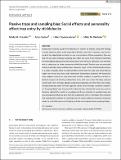Passive traps and sampling bias: social effects and personality affect trap-entry by sticklebacks
Abstract
Researchers routinely quantify the behaviour of subsets of animals, using their findings to make inferences about wider populations. Broader conclusions, however, may be inaccurate if the subjects that are tested are not representative of these populations. One way that this can arise is through sampling bias, which can occur if the method of collecting the test subjects disproportionately selects those with particular attributes, such that they end up being over‐ or under represented within the sample. Passive traps are associated with such sampling biases and have been shown to target certain behavioural phenotypes in a range of species. Here we asked whether funnel‐type fish traps were more likely to target more active and more social sticklebacks (Gasterosteus aculeatus). We found that more subjects entered the traps when they already contained conspecifics and that individual measures of activity predicted trap entry, with more active fish being captured sooner both when the traps already contained conspecifics and when they were empty. Unexpectedly, less‐social fish were captured sooner when the traps contained conspecifics. Sampling biases have the potential to skew the data collected by researchers and we therefore highlight the need to acknowledge and discuss potential for sampling biases and any consequences that may arise from this in published work. In the longer term, research that estimates the potential for sampling biases for various collection methods and species would be a valuable resource for helping to devise more representative sampling designs.
Citation
Kressler , M , Gerlam , A , Spence-Jones , H C & Webster , M M 2021 , ' Passive traps and sampling bias: social effects and personality affect trap-entry by sticklebacks ' , Ethology , vol. Early View , 13148 . https://doi.org/10.1111/eth.13148
Publication
Ethology
Status
Peer reviewed
ISSN
0179-1613Type
Journal article
Description
This research was funded by the University of St Andrews.Collections
Items in the St Andrews Research Repository are protected by copyright, with all rights reserved, unless otherwise indicated.

